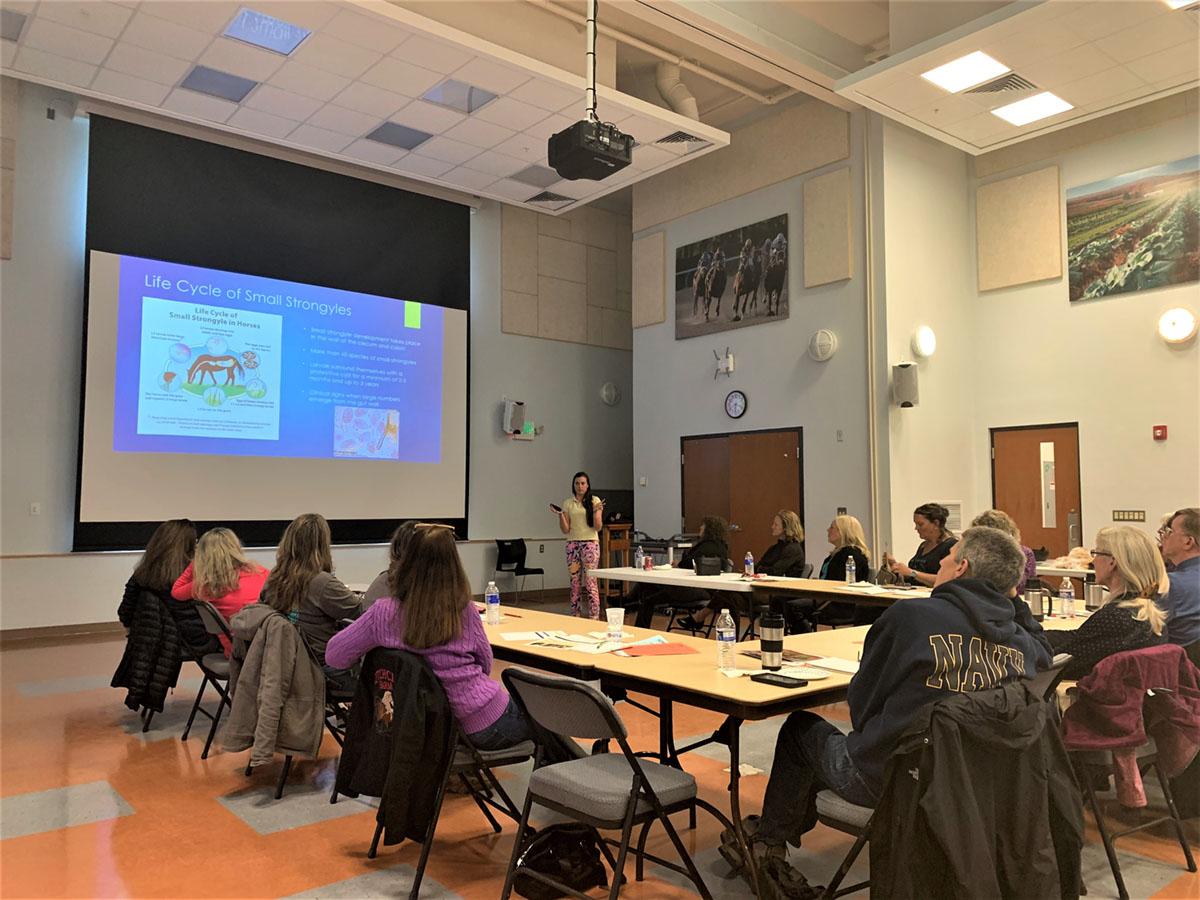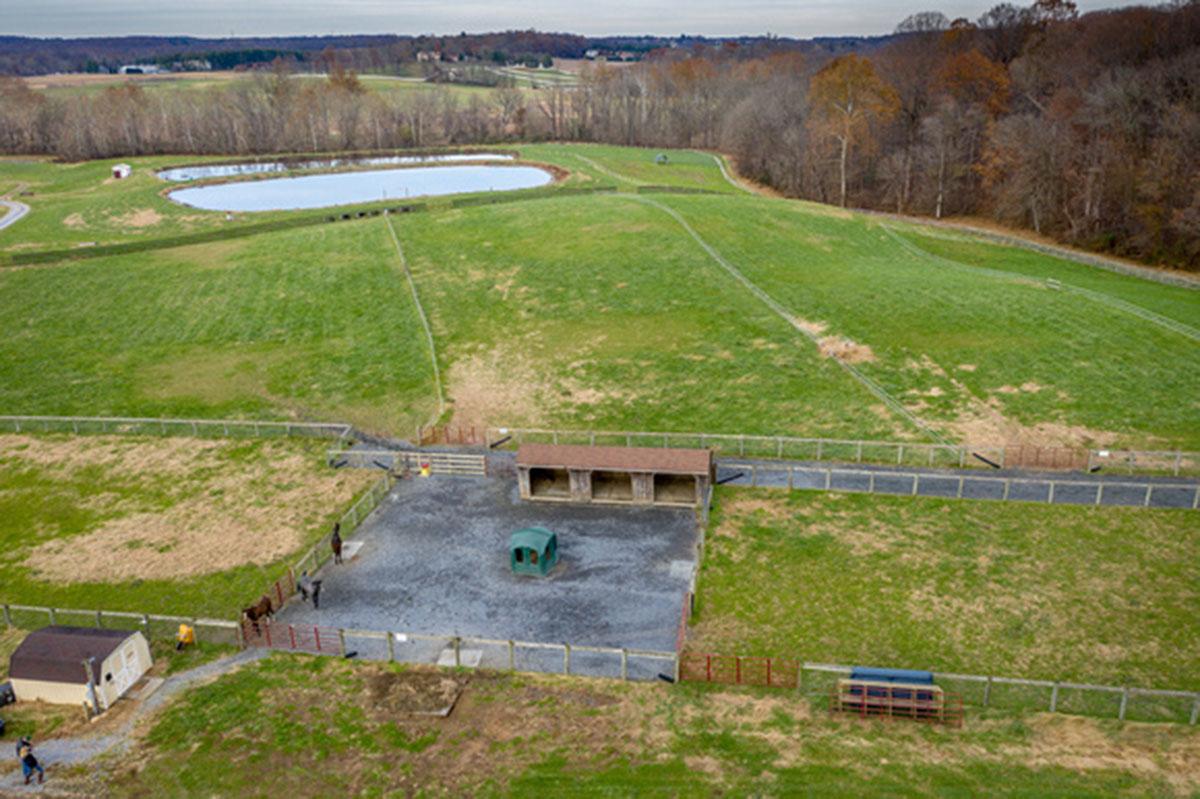
EBR-51 | July 2020, Updated May 2024
University of Maryland Extension Resources for Horse Owners

Maryland’s horse industry adds $2.9 billion to the state’s economy, according to the American Horse Council 2024 economic impact study. Maryland is home to over 94,000 horses and ranks number one in the United States in terms of horses per square mile.
University of Maryland Extension (UME) is a non-formal education system within the College of Agriculture and Natural Resources (AGNR) that has educators who can help guide and provide resources for Maryland’s horse enthusiasts.
UME consists of four program areas: 4-H and Youth Development, Agriculture and Food Systems, Environment and Natural Resources & Sea Grant, and Family and Consumer Sciences. All programs offered within UME are based on research and data generated at land grant universities and all programs are open to the general public.
UME has offices in all twenty-three Maryland counties and Baltimore City along with four educational research centers located throughout the state. UME employs equine educators and specialists in several counties in Maryland. To find the contact information of educators and specialists, visit https://extension.umd.edu/horses.
UME Resources Available
UME offers a variety of equine-related programs, online recordings, webinars, and publications that are offered either for free or for a small fee to the public.
- Pasture Management
Managing your pastures properly will lead to high-quality, productive forages for your horses. UME offers programs throughout the year to address different management strategies for pastures like rotational grazing, weed control, renovating poor performing pastures, and more. For more information on upcoming University of Maryland Extension Resources for Horse Owners pasture management events, visit the Maryland Forages Facebook page at https://www.facebook.com/MarylandForages - Soil Sampling
While University of Maryland does not have a soil testing lab on campus, Extension faculty can help you practice proper soil sampling procedures, provide a list of recommended soil testing labs in the Mid-Atlantic region, and loan soil probes to farm owners from county offices. Find your county office at https://extension.umd.edu/locations. - Forage/Hay Sampling
Proper forage and hay sampling is important and sometimes essential for horses with special dietary needs. Extension faculty can assist owners with proper forage sampling and may offer the use of a forage probe for sampling hay on the farm. - Nutrient Management Planning
In accordance with Maryland Department of Agriculture regulations, farm operators who own/manage eight or more animal units (1,000 lbs. = 1 animal unit) and/or gross $2,500 from the operation must develop and follow a Maryland Nutrient Management Plan. Nutrient Management plans can help equine operations increase soil fertility with proper fertilization records and reduce excess nutrient run off into nearby watersheds. UME offers plan writing as a free service in all 23 counties. Check out the Nutrient Management website, https://extension.umd.edu/anmp, for your county Nutrient Management advisor’s contact information. - Equine Seminars and Webinars
UME educators and specialists frequently host equine seminars and webinars for horse owners and farm operators. Topics vary from equine nutrition, health, and business management. Follow our social media page https://bit.ly/UMDEquineStudiesFB to learn about upcoming events. - Recorded Webinars
UME’s roster of recorded webinars includes topics on horse ownership and care, pasture management, and equine nutrition and health. Many of our seminars and webinars are archived and located on our UME Maryland Horses webpage (https://www.youtube.com/user/UMDHorseExtension). - UMD Horse YouTube Channel
UME has a large selection of short videos related to equine care and horse farm management. Visit our UME Horse Extension YouTube channel (https://www.youtube.com/user/UMDHorseExtension) to watch the latest videos from our Extension faculty. - Written Publications
Our UME Maryland Horses webpage houses a repository of publications on various topics written by faculty at University of Maryland and other land grant universities. Publication topics include manure management, nutrition, trailering, equine business management, and equine leasing agreements. Publications can be found on the UME Maryland Horses webpage https://extension.umd.edu/programs/agriculture-food-systems/program-areas/animal-science/horses/horse-resources/ - Equine Rotational Grazing Demonstration Site
The Equine Rotational Grazing Demonstration Site is part of the Central Maryland Research and Educational Center in Ellicott, Maryland. The 5.5-acre site was developed to educate equine farm operators about improved pasture management. The area includes a sacrifice lot, two vegetative heavy use areas, and four rotational grazing pastures. To arrange a visit, please contact Dr. Amy Burk at amyburk@umd.edu.

Additional Resources from UME Partners
UME is fortunate to have a great relationship with our equine industry partners. These organizations serve as resources for information as well as being helpful and supportive collaborators.
- Local Soil Conservation Districts
Maryland Department of Agriculture (MDA)’s Soil Conservation Districts can help with implementing best management practices for equine operations. Examples of best practices include managing heavy use areas, stream crossings, watering systems, roof runoff structures, and manure storage structures. Some operations may qualify for cost–share assistance. Contact your local district office (https://mda.maryland.gov/resource_conservation/Pages/technical_assistance.aspx) to obtain more information. - Horse Outreach Workgroup
The MDA assembled a group of forage, equine, and land conservation experts to develop fact sheets on important topics including manure management, pasture establishment and management, and mud control on horse farms. View the fact sheets at: https://mda.maryland.gov/resource_conservation/Pages/horse_pasture_manure_info.aspx or call the Office of Resource Conservation at 410.841.5865. - eXtension Horses
eXtension Horses is a national online learning platform for all equine enthusiasts. This website houses a large variety of online courses, podcasts, and infographics from university extension faculty across the nation. Visit https://horses.extension.org/ to learn more. - Maryland Horse Industry Board
The Maryland Horse Industry Board (MHIB) is a governor-appointed group whose broad mission is to promote equestrian activities and the use of horses for recreation through promotional activities. The goal is to create awareness and visibility for the equine industry, promote educational and research projects to benefit the equine industry, and support developmental efforts, such as job training programs, facilities planning and export marketing to stimulate the growth of the local horse economy. Moreover, the board advises the Secretary of Agriculture regarding matters affecting the industry and as the licensing body for Maryland stables. The Board has a mission that includes regulatory, advisory, promotional, and educational roles. https://mda.maryland.gov/ horseboard/pages/horse_board.aspx - Maryland Horse Council
The Maryland Horse Council, Inc. (MHC) is a 501(c)(6) trade association that represents all segments of the Maryland horse industry at the state and local level. Their core mission is to lobby state and local government for sensible and economically sound positions, and to provide educational and business networking resources for the Maryland horse community. https://mdhorsecouncil.org/ - American Association of Equine Practitioners
The American Association of Equine Practitioners (AAEP) is one of the largest organizations of equine veterinarians in the world. The AAEP is involved in educating horse owners and the general public about horse health and care. The AAEP publishes guidelines and best practices on various aspects of equine health and care, covering topics such as vaccinations, dental care, nutrition, and more.
ERIKA CROWL
ecrowl@umd.edu
JENNIFER REYNOLDS
jenreyn@umd.edu
This publication, University of Maryland Extension Resources for Horse Owners (EBR-51) is a part of a collection produced by the University of Maryland Extension within the College of Agriculture and Natural Resources.
The information presented has met UME peer-review standards, including internal and external technical review. For help accessing this or any UME publication contact: itaccessibility@umd.edu
For more information on this and other topics, visit the University of Maryland Extension website at extension.umd.edu
University programs, activities, and facilities are available to all without regard to race, color, sex, gender identity or expression, sexual orientation, marital status, age, national origin, political affiliation, physical or mental disability, religion, protected veteran status, genetic information, personal appearance, or any other legally protected class.
When citing this publication, please use the suggested format below:
Crowl, E., & Reynolds, J. (July 2020, updated May 2024). University of Maryland Extension Resources for Horse Owners (EBR-51). University of Maryland Extension. go.umd.edu/EBR-51.